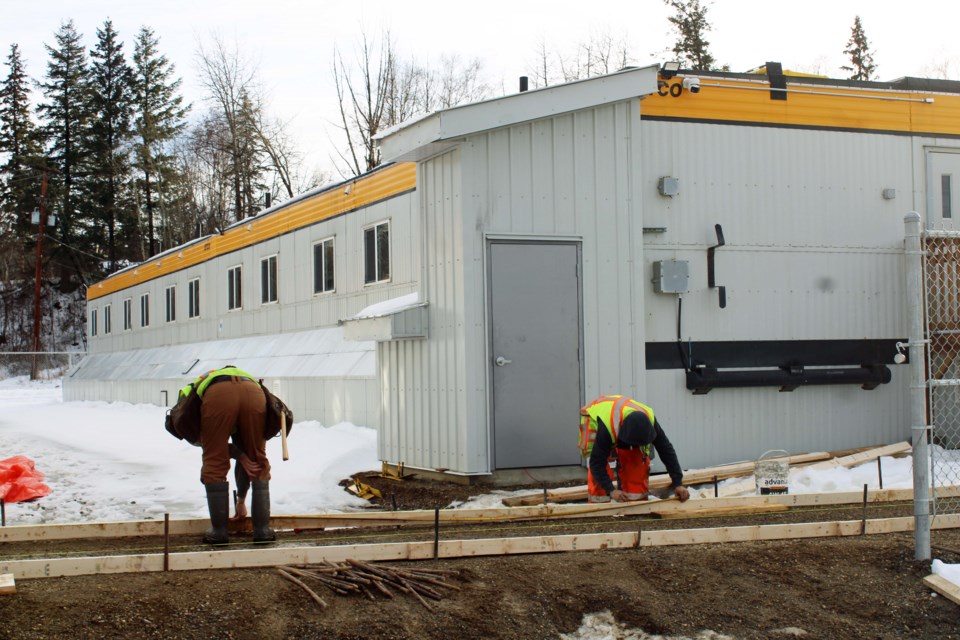The first occupants of a temporary shelter built adjacent to the homeless encampment on Lower Patricia Boulevard will be moving into the facility at 397 Third Ave. at some point in the coming weeks, BC housing reports.
After more than seven months of construction, the 42-room Homeless Encampment Action Response Temporary Housing (HEARTH) transitional shelter facility for people experiencing or at risk of homelessness is finished. BC Housing is now waiting on a permit to begin moving residents in.
Connective, the facility operator, will complete its staff training and kitchen setup over the next 10 days before the first occupants arrive.
The shelter is equipped with a commercial kitchen, amenity space (dining room and offices) and a shared laundry room. Each of the 42 units is equipped with basic furniture, bed sheets, towels and blankets. Some units have washrooms accessible for people with mobility challenges.
There is also some room for storage at the discretion of the operator, Connective.
Pets might be allowed, on a case-by-case basis, and those decisions will be left to the people who operate the facility.
A third-party security company has been hired and the modular camp is equipped with cameras. Staff are trained in how to utilize the cameras and security system to mitigate risks. The entire site is fenced and a gatehouse will be installed after occupancy begins.
Residents who smoke or vape will be required to do so outdoors in a smoking area that is within sight of the office and cameras. The shelter will also have a supervised safe consumption area for drug users. The trailers are all equipped with a sprinkler system and residents will have the protection of fire alarms, smoke detectors and fire extinguishers.
The low-barrier housing will be made available to people who have a varying degree of needs and the transitional facility meets the government’s Housing First mandate which emphasizes housing as a basic need that provides the stability and safety needed for individuals to rebuild their lives.
According to BC Housing, the criteria for choosing residents will be based on the following:
“Residents will be people who are living in the community in shelters and from the Lower Patricia encampment who are ready for independent housing with embedded supports. Tenant selection is a collaboration between Connective (the building operator), BC Housing and several other agencies.”
Preference will be given to Prince George residents, especially those currently living in encampments.
The Third Avenue camp is not designed to allow couples to room together nor is there support for families with children.
“For families who are experiencing homelessness, BC Housing prioritizes providing subsidized housing, as it’s available and when it matches the needs of the individual, said BC Housing spokesperson Cait Wills, in an email to The Citizen.
“All shelter staff in Prince George have access to resources through the Ministry of Children and Family Development should anyone request supports for minors, and the Youth Connects youth shelter is also available as a service. Additionally, there are two women’s transition housing shelters in Prince George available for women and children fleeing domestic violence.
“In Prince George, for couples seeking shelter, the Second Avenue Temporary Housing Drop-In Centre may be able to accommodate them. In supportive housing, couples are typically given their own units, and they can visit each other as they wish.”
Third Avenue residents will receive daily meals and will have 24/7 on-site staff support, where they will have access to healthcare referrals/wellness checks and connections or referrals to community services and support groups.
Residents will pay rent and be required to sign an agreement that outlines their responsibilities but that will not be considered a rental agreement because the units are considered transitional housing.
Guests will be permitted but will be required to follow defined visitor policies.
The provincial government is providing B.C. Housing $4.1 million in funding to establish the camp. The city provided $468,126 for ground preparation and water/sewer and utilities hookups that will serve the housing project. Site preparation began in early May and installation of the ATCO trailers that make up the facility started in June.
BC Housing has a three-year temporary use permit and in April entered into a lease agreement with the city for the property.
Connective is a community-based social services non-profit operating across BC and Yukon. The housing operator currently manages four other sites in Prince George. The province selected Connective as the Third Avenue operator based on its history of providing innovative, person-centered services that help individuals meet goals and become more independent.
Eric Depeneau, the city’s director of administrative services, updated council in October and said the eventual dismantling of the legally protected Moccasin Flats (Lower Patricia) homeless encampment remains on track. The city still intends to go to the BC Supreme Court by the end of the year to request that the ban on evictions from the site be lifted now that the majority of residents of the flats have moved on.
In February 2022, in a landmark court case, the city was barred from tearing down Moccasin Flats and displacing its residents until alternative shelter and daytime destinations could be arranged for them.
BC Housing hosted two community engagement information sessions in March to discuss the Third Avenue shelter and several neighbouring business operators did express concerns about having the facility in the area. If you have any questions or comments, contact BC Housing through email at [email protected].



